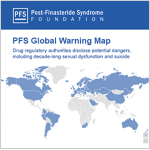Adverse drug reaction reports worldwide: 22,251
The World Health Organization Programme for International Drug Monitoring’s database of adverse drug reactions (ADRs) currently contains 22,251 finasteride ADRs, including 3,890 reports of erectile dysfunction and 2,061 reports of sexual dysfunction. Additionally, the database contains 5,561 reports of psychiatric disorders, including 2,108 cases of depression and 1,596 cases of anxiety.
If you, or a loved one, have experienced any adverse reactions to finasteride and have not yet reported those reactions to your federal drug-regulatory agency(s), please access our Report Your Side Effects page and do so as soon as possible.
Known suicides worldwide: 111
The World Health Organization Programme for International Drug Monitoring’s database of adverse drug reactions currently contains 111 cases of completed suicide, 53 cases of suicide attempt and 599 cases of suicidal ideation. Additionally, the database contains 578 cases of “death” as a subset of “General disorders and administration site conditions.”
If you know of any PFS patients who have taken their own lives, please email proberts@pfsfoundation.org. Please be prepared to furnish us with pertinent medical records, or with contact information for a family member who has such records, so that we may independently verify each case.
Nations warning of PFS: 56
Second only to “Is there a cure for PFS?” the most common question that comes our way is, “How can this drug still be on the market?” Those asking are typically (a) young men grappling with the reality that a “safe and effective” hair-loss remedy has maimed them, or (b) the loved ones of a PFS patient who recently threatened, attempted, or completed suicide. Our initial response is, “Beats us.” Because we like to think that any astute person who examined the evidence housed on this website—medical literature, epidemiological data, doctor testimonials, patient pleas, media coverage, and corporate malfeasance—would conclude that marketing authorization for finasteride should immediately be canceled. Then we explain that, since the drug’s 1993 launch, there have been a number of moves by federal drug regulatory authorities to warn the public of its many potential dangers. For more information, consult our PFS Global Warning Map now.
PFS research studies published: 69
Over the past 13 years, researchers at leading institutions—from Harvard Medical School to Northwestern University Feinberg School of Medicine to Baylor College of Medicine to The George Washington University School of Medicine and Health Sciences—have published clinical studies and statistical analyses on PFS in leading journals, including JAAD, JAMA Dermatology, The Journal of Clinical Endocrinology & Metabolism, PeerJ, Pharmacotherapy and American Journal of Men’s Health. To date, the PFS Foundation has aggregated 69 such papers on our Medical Literature page. Going forward, we will continue to review such literature and house it here for the edification of clinicians, researchers, patients and their family members, regulatory officials, and members of the media.
If you know of any additional PFS-related medical literature that you would like us to consider housing on our website, please email pertinent links to proberts@pfsfoundation.org.
Doctors and researchers speaking out worldwide: 180
A growing number of doctors, researchers and therapists have in recent years been voicing their concerns about finasteride’s potential to cause persistent physical and mental side effects, known as post-finasteride syndrome (PFS), in a subset of patients. To date, the PFS Foundation has identified 180 such professionals who have published scientific findings and/or voiced opinions on causative links between finasteride and PFS. Those findings and opinions can be reviewed on our Doctors & Researchers Speaking Out page. Some of these same doctors and researchers are also members of our Medical Professionals team, counseling PFS patients and their loved ones worldwide.
If you know of any additional doctors, researchers and/or therapists who have published warnings of persistent side effects stemming from finasteride use, and/or if you would like to suggest adding a medical professional to our Medical Professionals list, please email pertinent links/names to proberts@pfsfoundation.org.
National media reports worldwide: 322
The PFS Foundation tracks global media coverage of post-finasteride syndrome on an ongoing basis. We then house significant media reports about the condition on our PFS Media Awareness page. To date, we have aggregated 322 national media reports and 58 local and/or trade media reports.
If you know of any PFS media reports, in any language, that are not currently housed on our PFS Media Awareness page, please email pertinent links to media@PFSFoundation.org.
Total website users worldwide: 948,543
PFSFoundation.org was launched on August 28, 2012. Since then, according to Google Analytics, more than 948,543 users across the globe have visited the website. Along the way, we also launched four foreign-language editions, corresponding to the most widely spoken languages on earth, after English. Following is historic use to date of each of those editions:
• English (08/28/12 launch): 760,233 (unique users)
• Spanish (04/09/19): 97,831
• Chinese (10/21/19): 55,070
• Russian (05/06/20): 31,658
• Hindi (01/20/21): 3,751
Total unique users 2012 to date: 948,543
Years finasteride has been on the market: 32
Proscar (finasteride 5 mg), a prescription medication used to treat an enlarged prostate in men, was approved by the United States Food and Drug Administration on April 5, 1993.
Propecia (finasteride 1 mg), a prescription medication used to treat male pattern hair loss, was approved by the United States Food and Drug Administration on December 19, 1997.

